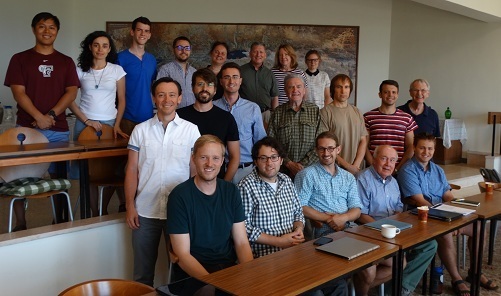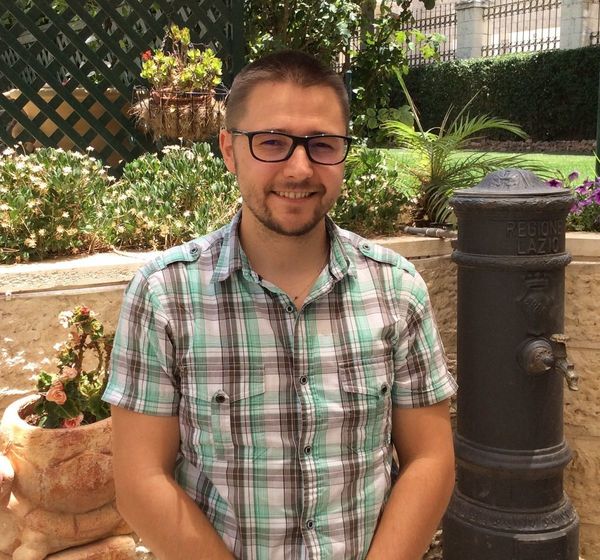
In July 2018, Prof. Nenad Bozovic' PhD, of the Faculty of Orthodox Theology of the University of Belgrade, Serbia, attended the "Salvation History Today" summer seminar held at Tantur. This annual seminar is co-organized by the Department of Theology of the University of Notre Dame and Tantur Ecumenical Institute.
It was a rainy February day in Belgradе as I sent in my application by e-mail for the Tantur Summer Seminar in Jerusalem. Not long after, I received the confirmation e-mail that my application was accepted. At that moment, I recalled Psalm 122: I rejoiced with those who said to me, “Let us go to the house of the Lord!”
And so, this past July I had an honor of visiting the Tantur Ecumenical Institute in Jerusalem as a seminar attendee. At the very entrance I was struck by an old Maltesean tower which once guarded the hospital on the very mount where nowadays the Institute is. It is amazing how every corner of the Holy Land can tell you a story. This notion came to be true so many times during my stay. The view from Tantur on that sunny day reached over to other surrounding hills of Gilo, Beit Jala and Bethlehem. The beautiful garden of the Institute recalled the Eden story: it is indeed a peace of Eden on Earth!
The Seminar began with the lecture of Father Brian Daley, professor of Notre Dame University on the Salvation History. In his lecture, he reminded us on the writings of Oscar Cullman about Salvation History, especially on his notion that salvation itself is not only about the life of individual and his personal relationship with Christ, but it has also a more broader historical context. It has a lot to do with Gods' revelation and work in history, and the human response to it. That includes multitude of peoples, their historical deeds and their cultures. This notion made me thinking: is the true devotion only about waiting the Kingdom to come or do we as humans have yet a role to play in prompting the Kingdom to come? Could we, for example, also perceive the restoration of the unity of the church as a process of salvation history? Many other questions and fruitful discussion occurred after this inspiring lecture.
Mr. Neil Arner, assistant professor of Notre Dame University held a very inspiring lecture on eschatology and salvation history as a biblical hermeneutic. He recalled the words of N. T. Wright in “The Whole Sweep of Scripture” which state that the whole Bible is like a symphony and sometimes it makes no sense to extract only a portion. After the word God, the most common word in the Bible is King (Kingdom) which tells us that the whole Bible could be read as a "Story of the Kingdom" from its beginnings in Genesis till Revelation. It really struck me that The Story of Kingdom is a very useful hermeneutical background for reading of salvation history and a good way of canonical reading of the Bible.
On weekends we had an opportunity to enjoy on the study trips which included visit to Judean desert, Baptismal Site on Jordan river, Mount of Temptation and many other sites. I found the trip to Masada, Ein Gedi and Samaritan museum with Mr. Steven Fine, professor of history on Yeshiva University; very helpful. He gave us a totally new perspectives on zealot fight in Masada, as well on some aspects of Judaism in Late Antiquity. A grasp on the landscape of the desert and a notion of Judean geography influenced profoundly on some aspects of my understanding of the biblical texts.
The visit to Mar Saba monastery with Mr. Daniel Koski, Marketing and Communications Director of Tantur Ecumenical Institute, made a great impression on me. To be at the place where St. Savvas prayed and where St. John the Damascene wrote his works was profoundly inspiring. The brotherhood of the monastery dedicated some of their time to talk with us and give some spiritual counsel. This experience was even further significant as this monastery was also one of the stops of Saint Sava of Serbia during his pilgrimage to the Holy Land in 13th century, which is for me as an Orthodox Christian of great significance. A glance on the Kedron Valley and the desert hills that surrounds this holy place reminded me that this place didn’t change so much from the time St. Sava was here. He knew in his time how important was for Christians to be close to the Holy Land. I am very grateful to those who introduced me to the work of Tantur Institute and prompted me to visit the Holy Land and thereby reminded me of a very ancient calling to walk on the path of fathers as St. Sava.
This summer seminar gave me a lot of impulses for my future academic work and it was also useful for my spiritual growth. The seminar has deepened my understanding of biblical message. Salvation history as framework for rethinking the biblical texts as a whole gave me profoundly new understanding of many biblical passages and as well a new perspective of reflecting the text as a whole (canonical reading). All of the above mentioned experiences will certainly have a part in shaping lectures for students on the Orthodox Theological Faculty in Belgrade, spreading the word about the Holy Land and reaching the broader audience of young theologians in Serbia.
The last biblical scholar from Serbia who was in contact with the Institute was the renowned Prof. Emilijan Carnic', when the Institute was still in its early years. My visit to Tantur could also be seen as a rebuilding the connections that the Orthodox Theological Faculty in Belgrade had with the Institute. I felt that it was another step towards a greater connection between Tantur and my Faculty, and one that we can continue to work on strengthening. Therefore I owe a great gratitude to all the people who helped me visit Jerusalem and the only way I can repay them is through a sincere prayer in my heart: May those who love you be secure. May there be peace within your walls and security within your citadels (Ps 122, 6-7).

Shortly after his return to Serbia, Prof. Nenad Bozovic' was informed that he was confirmed for a position of an assocate Professor of the Orthodox Theological Faculty in Belgrade . His personal Serbian-language blog on his experience while in the Holy Land can be viewed at teologija.net, with a query search for Nenad Bozovic'. Prof. Nenad Bozovic' may also be reached at nenadbozovic85@gmail.com.